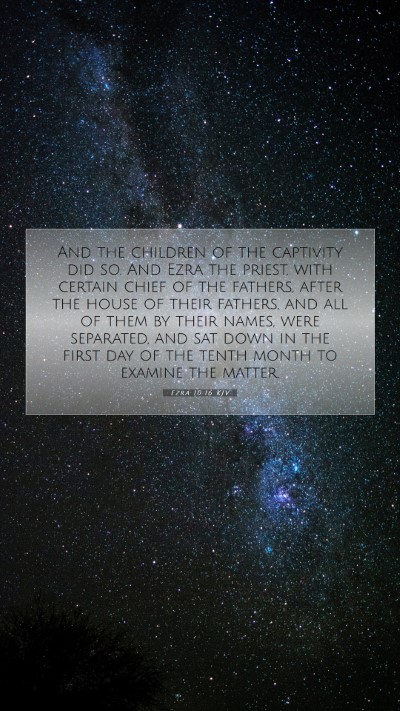Understanding Ezra 10:16
This verse reads:
"And the children of the captivity did so. And Ezra the priest, with certain chief of the fathers, after the house of their fathers, and all of them by their names, were separated, and sat down in the first day of the tenth month to examine the matter."
Overview
Ezra 10:16 marks a critical moment in the history of the Jewish people returning from exile. Here, we see Ezra the priest taking on significant responsibilities during a pivotal time of reform. This verse signifies both the action taken by the captives and Ezra's leadership and organizational role in addressing issues stemming from intermarriages and spiritual rebukes the returning exiles faced. Scholars such as Matthew Henry, Albert Barnes, and Adam Clarke provide profound insights that clarify the underlying themes present in this verse.
Verse Meaning
This verse outlines the process the captives engaged in as they returned to their homeland. They followed Ezra's directive, indicating a collective agreement and willingness to rectify the moral failures of their previous actions, particularly regarding intermarriage with foreign women. The act of separating and examining reflects a crucial self-examination for the spiritual welfare of the community.
Commentary Insights:
In reviewing prominent commentaries, the following interpretations emerge:
- Matthew Henry: He emphasizes the importance of accountability within the community. Ezra's leadership is pivotal, and it shows that congregational order is vital after returning from exile. This organized approach to the situation emphasizes the seriousness of their plight and the need to address their grievances thoughtfully.
- Albert Barnes: Barnes notes that the act of examining the matter signifies more than mere administrative work; it is a spiritual act filled with consequence that could dictate the future of the community. Even during a time of personal crisis, dedicating time to introspection can be beneficial for future restoration.
- Adam Clarke: Clarke highlights the involvement of particular leaders in this process, suggesting a call to action for those in positions of authority. They had to set the example for others, implying that leadership is not just about guidance but also about participation in the crucial processes of healing and restoration within the community.
Spiritual and Historical Significance
The historical context of Ezra 10:16 is essential. The Israelites had just returned from Babylonian exile, a crucial period filled with social and spiritual complications. Their mixed marriages with foreign peoples compromised their faith and traditions. Hence, Ezra took it upon himself, along with other leaders, to address these issues. This verse encapsulates the broader theme of returning to faithfulness and purity within the covenant community of Israel.
Applications of Ezra 10:16
For modern believers, applying the meanings extracted from Ezra 10:16 involves recognizing the importance of spiritual accountability and the value of community in preserving faith principles. The need for self-evaluation and corporate repentance is timeless and extends beyond the context of the passage into today’s church settings.
In Conclusion
Ezra 10:16 serves as a reminder of the importance of leadership, community accountability, and the serious examination of our spiritual practices. Insights from various commentaries assist believers in understanding the layers of meaning embedded within this passage. This is essential for anyone engaged with Bible study insights, seeking Bible verse meanings, or looking to cultivate a deeper understanding of Scripture.
Cross References
- Nehemiah 10:29: This emphasizes the covenant agreement made by the people.
- Ezra 9:1-2: Highlights the main issue of intermarriage that sparked this reform.
- Malachi 2:11: Discusses the impact of foreign marriages on the covenant with God.


